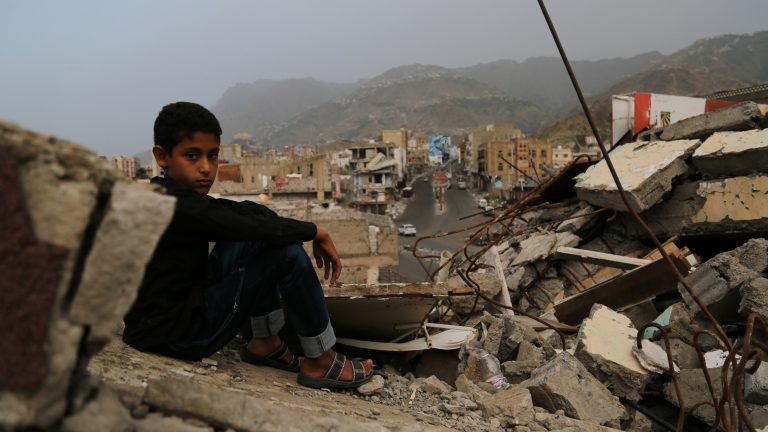Is the tide turning?
Three governments in three weeks have said they will stop selling weapons to countries involved in the war in Yemen.
Germany is the latest supplier to announce such a move, saying that as part of negotiations to form a new coalition government it has agreed that no new arms exports would be agreed to conflict parties in Yemen.
This includes Saudi Arabia and United Arab Emirates, the two countries that since March 2015 have led a military coalition that has bombed and blockaded the civilian population of Yemen to the brink of famine and into the worst cholera epidemic of modern times. Germany had been a significant supplier to both countries. In 2016 (the last year for which full data is available), Germany authorised military exports worth €21m to Saudi Arabia, and €17m to UAE, making them Germany’s 6th and 7th most valuable ‘third country’ destinations.

The war in Yemen started almost three years ago and has lead to the death of thousands Photo credit: Mwatana Organization for Human Rights
This week’s decision owes as much to domestic politics as international pressure, but is a welcome boost for campaigners who have been calling for a halt to all arms transfers to countries involved in bombing Yemen.
It sees Germany become one of the countries most closely aligned with the European Parliament’s call for a EU arms embargo against Saudi Arabia given the serious allegations of its breaches of international humanitarian law in Yemen.
It also removes Germany from the list of 19 members of the Arms Trade Treaty (ATT) identified by Control Arms in 2016 as supplying arms to Saudi Arabia. Several of those 19 countries have already made moves to tighten their export policies towards Saudi Arabia, like the Netherlands and Switzerland.
Germany’s news also follows hard on the heels of similar policy shifts announced this month by Norway and the Walloon regional authority in Belgium. Norway, who already say they do not permit arms sales to Saudi Arabia, made public a recent a decision to temporarily revoke all outstanding arms export licenses to UAE. Norway assessed a rising risk that transferred weapons could be used by the UAE in Yemen
Walloon is one of three regional authorities in Belgium that can make independent arms transfer decisions. This month, it announced it would no longer authorise any licenses to the Ministry of Defence of Saudi Arabia, or for military equipment that could be used in the Yemen conflict. Walloon also decided to stop export licenses to UAE because of fears that weapons might be diverted for use in Syria.
These three governments, all previous suppliers of arms and ammunition that could have been used in Yemen, have joined the group of countries that have seen the devastation and destruction, the violations of human rights and the rules of law, the desperate, cruel state of the civilians of Yemen, and have said no. Enough. We signed up to laws where we said we would be responsible players in the arms trade, and we mean to live up to our obligations.
It’s time for those outliers still ignoring their ATT obligations and the suffering of the people of Yemen, like France, the UK and Italy, to wake up and realise that they are on the wrong side of history here.
After years of campaigning, the tide may be turning. Time for an end to business as usual.

Is there any way you can stop the latest arms sales by Britten to Saudi.
That is interesting post …
I added your web-site into my favourites!
Keep up good work! Looking forward for new updates!
Cheers!
William
Really appreciate you sharing this post.Thanks Again. Awesome. http://u4vynvf5.tumblr.com/ – Kuliga